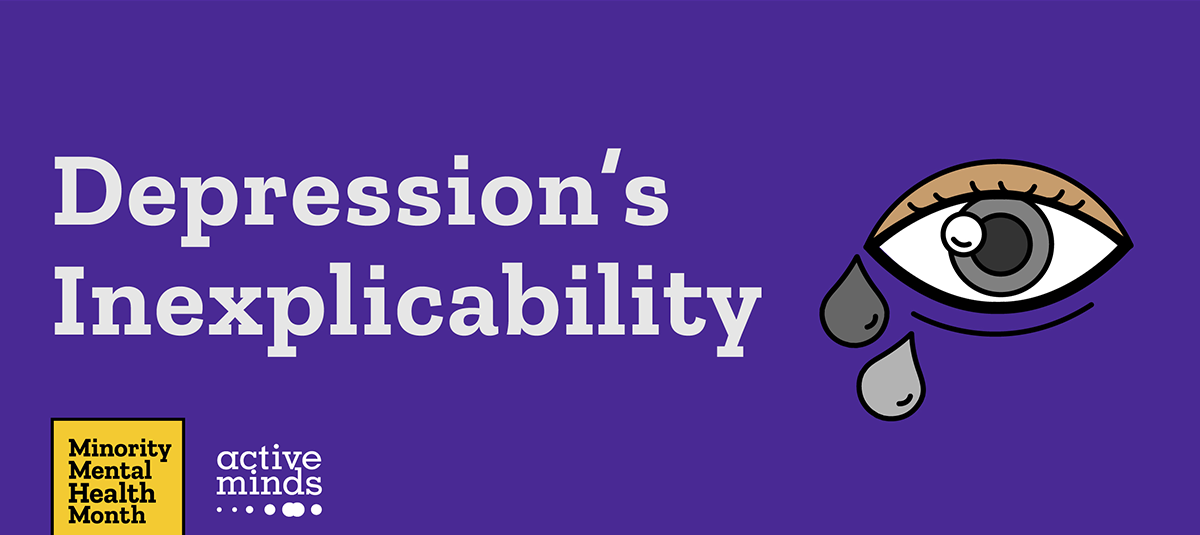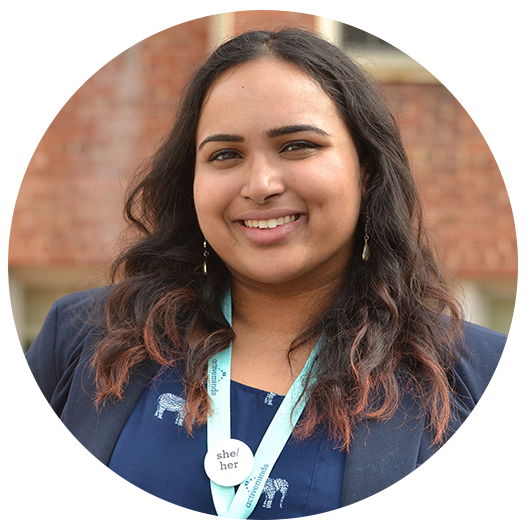Depression is blind. It doesn’t see your color. It doesn’t see your privilege. It doesn’t see how well your life is going. It doesn’t see anything. It just hits you.
Getting diagnosed with depression was a very interesting journey for me. I have been involved with Active Minds for a while, not because of any personal connection, but because I saw how far we needed to go in regards to mental health awareness. Coming from an Indian family, mental health is not talked about at all. No one talks about anything remotely related to it, and when I told a few people I was involved with Active Minds, I could immediately tell it was a foreign idea. I was a mental health advocate. I went to counseling myself, but no one ever asked me to – it was a decision I had made on my own, and till this day I strongly advocate that you do not need to be diagnosed with anything to attend counseling.
However, things changed when I got diagnosed with depression. I knew it was not my fault. I knew that depression has its own mind and does not care how well your life is going. After being diagnosed, I was okay; I knew what I was going through, and how it had and has been affecting me. In fact, it was nice to have a label on what I was going through. It was very difficult, but I knew I had the right support from my friends and my counselor. The only hard part was telling my parents.
Before I continue this story, it is very important I bring up how supportive my parents are. A lot of my family and extended family believe there are only two respectable professions in this world – engineering and medicine. However, when I told my parents I was interested in another profession – Speech Language Pathology – they did not bat an eye. They knew it was something I was passionate about and continually support me. They have always supported most areas of my life, and although we have occasional hiccups, at the end of the day, they love me and support me for who I am.
So when I wanted to tell my parents about my depression, I did not think it would be too bad. But I was not ready with the answer to the one question they had: “Why?” They were wondering how I could possibly have depression. I am doing well in school. I have great friends and family. I have supportive parents. I knew what I wanted to do with my life, and I was going the right way. Unfortunately, this worsened my depression. Asking myself “Why?” was the only thing I knew I did not have to do, but when people I love so much asked me this, it was all I could think about. I started thinking about the “why” every single day, and, trust me, I did not want to think like this. I started beating myself up with this question even though I knew, logically, there was no reason to. But I wanted my parents to understand; I wanted their support that I had in other aspects of my life and tried so hard to find that “why.”
They were also unable to understand that I was not “acting depressed.” I am an extrovert and do a really good job putting up a front (my counselor reminds me). I never “look” depressed. In fact, there are so many people out there who do not look depressed. Not everyone stays in bed all day and has the cookie-cutter look of depression. There are so many shapes and forms, and it is definitely not something you can always see when you look at or meet someone. When I am around people, I am my usual loud, talkative self. My depression affects me throughout the day, but I just do an academy-award-worthy performance when I am around people, and things are very different when I am on my own.
Since I did not have a logical explanation of why I have depression, my parents did not believe me. They thought this was something my counselor made up, and I was unnecessarily going to counseling. They were unable to grasp the idea that their bright daughter had depression. In addition, they believed that, if I did in fact have depression, I was not doing anything to “fix” it. I was going to counseling and figuring out things on my own, and while things might not have “changed” right away, like everything, it takes time. I was doing my best and making my own strides, which might not have been visible to them. My parents wanted to do everything they could to support me, but it was something they found confusing. But it is not their fault; the idea of depression is foreign to them, and they were not sure how to respond. And with all I was going through, I was unable to guide them on how to react appropriately. It was a difficult situation for everyone to be in.
It really comes down to education. Education does not mean schooling. Someone can have a PhD and still be unaware of how to react to topics like mental health. Trust me, I’ve met them. It’s about time we start talking about mental health as much as we talk about physical health. We share workouts, recipes, and other health advice with our friends – how about we start sharing what we do for self-care and other mental health related ideas as well? The more we talk about it, the more it can be an idea that is easier to understand, even for those who have no exposure to it.
Being surrounded by one kind of crowd at school – one that understands mental health more – and coming home to a different crowd was a little wake up call on how much further we have to go. I am so fortunate to be a part of an organization like Active Minds that has helped me during hard times and is working hard to change the conversation around mental health. I know eventually things will change and, hopefully, the level of understanding will be the same, no matter who I am talking to. I love my parents and everything they have done for me, selflessly. Like everything, it takes time for everyone to be on the same page. Everything is a journey, including this – my mental health journey.




